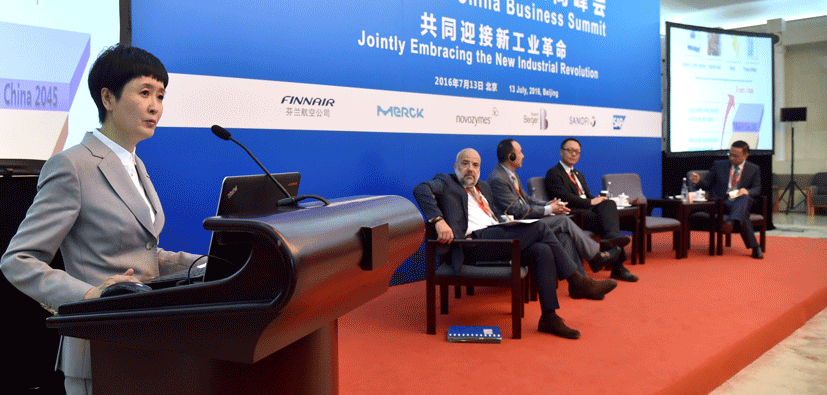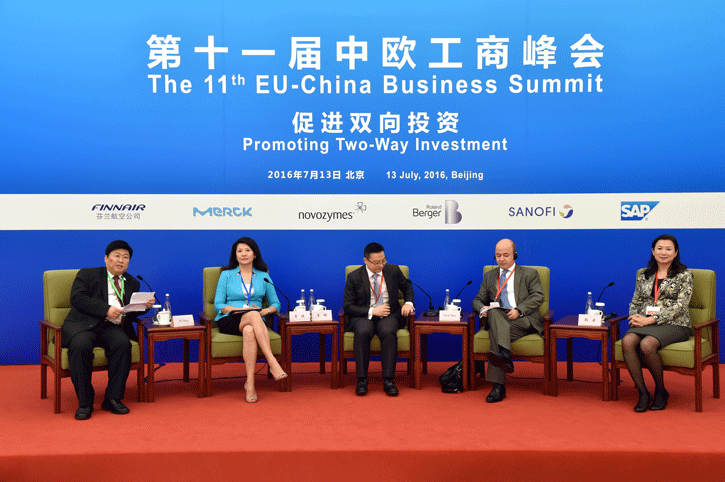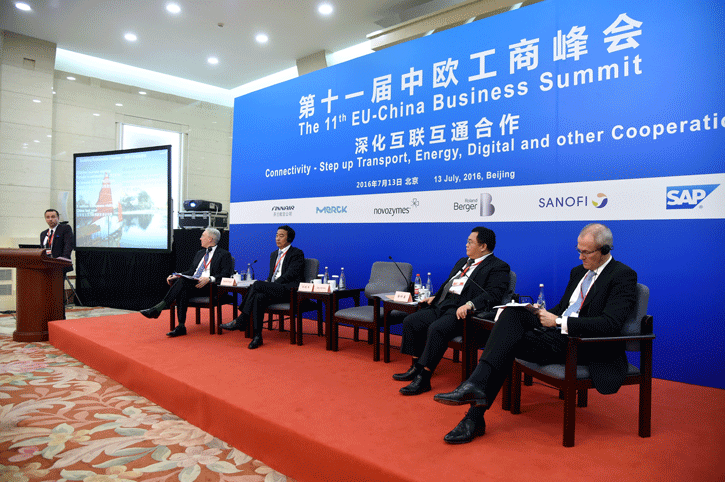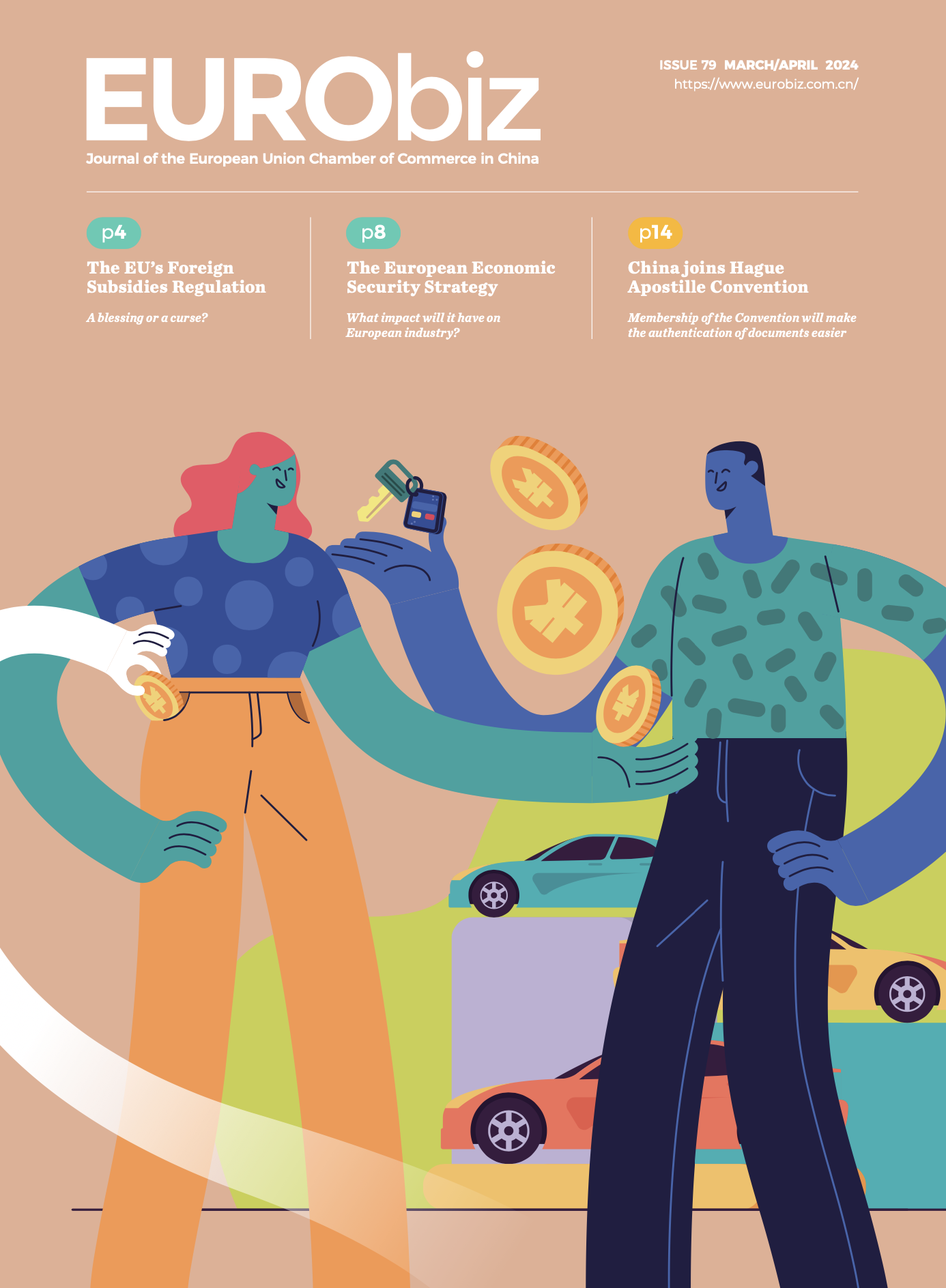The 11th EU-China Business Summit took place on 13th July, 2016, at the Great Hall of the People in Beijing. Following speeches given by European Commission President Jean-Claude Juncker and Chinese Premier Li Keqiang, more than 600 business leaders from Europe and China attended workshops on investment, the new industrial revolution and connectivity.
Jointly Embracing the New Industrial Revolution
Dr Markus Kerber, CEO and Director General, Federation of German Industries (moderator)
Xiao Hong, CEO, Beijing Perfect World Network Technology
Eamon Zhao, Head of Public Affairs and Communications, Novozymes
Li Ye, Vice President Government Affairs, Merck
Bo Lianming, COO and President, TCL Corporation
Embracing the new industrial revolution for many companies will entail a process of localisation, for EU companies in China and vice versa. “We have our own R&D centre in China, with scientists who were born and grew up here, who went abroad to study and now came back to China,” said Li Ye, “This is our development model.” This sentiment was echoed by Bo Lianming, who explained that they approach the European market by cooperating with local partners, because “they have a better understanding of customers’ needs.”
Companies will also need to leverage worldwide capital—their people—to develop globalised products, according to Xiao Hong. “For example, a subsidiary in Japan employs designers from the US, French artists and Chinese engineers, all working together,” he said. He later mentioned that direct communication between people is the most effective way to get products into different markets, citing immigration restrictions as a global challenge to the free flow of human capital that needs to be solved.
The transition towards the fourth industrial revolution will not be trouble free. In addition to cultural obstacles, differences in laws will also pose significant challenges. The complexity of Europe’s legal environment, for example, meant that TCL had to pay a high “tuition fee” to accumulate experience. But in time, Bo acknowledged, these difficulties were overcome.
Promoting Two-way Investment
Wu Meng, Deputy Director-General, CCOIC (moderator)
Iris Jia, Group Vice President, AnBang Insurance Group
Xavier Denis, Chief Economist-Strategist Private Banking, Société Générale
Liao Feng, Senior President Assistant, China Minsheng Investment Group
Cathy Qian, VP Greater China, Sanofi
With increased EU-China cooperation comes a mutual responsibility to continue to open up trade and market access and successfully conclude the Comprehensive Agreement on Investment (CAI). The EU and China should not only be driving investment activities in each other’s markets, however, but also in third countries. An ideal starting point is the One Belt, One Road policy, which provides opportunities for Chinese companies and EU companies to invest together in other markets.
Greater opening of financial markets in China would contribute to economic development on a global scale. Internationalisation of the RMB has increased in parallel with Chinese companies going global. “By 2025, 25 per cent of the Fortune 500 will be in China,” said Xavier Denis. “This expansion will require the help of global banks that will be in a position to boost growth by marketing RMB-dominated bonds to the global market, thereby [further] boosting the RMB’s internationalisation.”
Accelerating company registration processes, improving IP protection and establishing incentive mechanisms are all seen as measures that will help to create a better environment for investment and innovation in China.
Factors surrounding Chinese investor interest in the EU are not limited to financial crises and cheap capital or properties, but also the high quality of capital and properties. In addition, the culture and history of EU Member States makes the single market an attractive option for those considering overseas investments.
Liao Feng said that aside from regulatory barriers and protectionist policies, challenges to EU-China investment “include a lack of a common understanding and communication between government and business,” adding, “This is where interest groups like the European Chamber of Commerce and CCPIT can be important in bridging the two sides.”
Connectivity
Patrick Horgan, Vice President, European Chamber of Commerce (moderator)
Qiao Baoping, Chairman, China Guodian Corporation
Xu Xinquan, Vice President, Le Holdings
Juha Järvinen, Chief Commercial Officer, Finn Air
Mark Gibbs, Global SVP and President of Greater China, SAP
The Europe 2020 Strategy dovetails nicely with China Manufacturing 2025, said Mr Qiao, which lays “a solid foundation for [EU-China] cooperation on energy connectivity.” He acknowledged that the EU-China Business Summit provides a good platform for high-level exchanges between Chinese and European business leaders, and went on to say that he expects that in the future working relationships with his EU business counterparts will become even closer.
Mr Järvinen asserted that air connectivity is the key to unlocking a country’s economic growth potential, in part because it enables the country to attract business investment and human capital, and also spurs tourism, which is vital to many countries’ economic prosperity. “Enhancing Connectivity is key to unlocking greater growth and maximising China’s and the EU’s economic potential,” he said.
Within the context of digitalisation, Mr Xu listed the top-three connectivity trends as the restructuring of the value chain and closer sectoral integration; the development of the sharing economy; and increased globalisation. “The convergence of globalisation and digitalisation means that business leaders and policy-makers will need to reassess their strategies, and given that we are only in the very early stages of this phenomenon, enormous opportunities are still at stake,” he said.
Mr Gibbs pointed out that the fourth industrial revolution is happening at a faster pace, across a wider area and is generating greater impact. Cooperation on connectivity still entails challenges, with the tendency to overcomplicate being one of the key barriers to innovation and the transition towards digital. Consumers are, he said, willing to pay more for simpler experiences.





Recent Comments